Apps with in-destination information are an opportunity for DMOs, says eMarketer
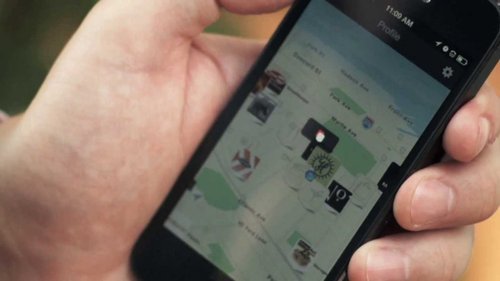
“As smartphones become ubiquitous among travelers, DMOs and SMBs can attract and retain customers by offering mobile features that guide travelers through their destination, not just to their destination”
This was the verdict of eMarketer, based on a new analysis of the usage of mobile to do local searches for restaurants and things to do while traveling.
Almost half have travel apps now
Almost half (43%) of US travelers with smart phones have installed travel apps, and 30% has several of them.
That’s in line with the general trend, as most travelers today get their mobile out during their trip. MMGY Global, a travel marketing agency, and Harrison Group have discovered that among US leisure travelers, 62% used their smartphones and 43% used tablets.
Travelers who search are open for suggestions
Travelers use their phones to search for places to sleep, eat and things to do, says a comScore report, which found that two-thirds of local business searches for hotel and travel information in December 2012 were nonspecific, suggesting that people looking for travel information on the local level are seeking suggestions, rather than planning pre-decided activities. This means they are open for new restaurants, hotels and experiences to woo them. This is great news for businesses that have made sure to optimize for mobile search with mobile optimized pages.
Travel info missing in most hotel apps
Despite the demand for travel-related information most organizations in travel, in particular hotels, have so far failed to provide their guests with this service, this provides an opportunity for DMOs and hotels to engage travelers with this kind of information.
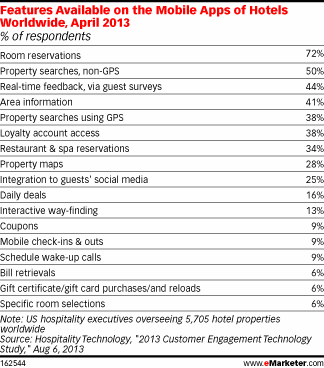
Guests appreciate curated recommendations
One hotel which is leading the charge on this is Hotel Alexandra, a boutique hotel in Copenhagen. The hotel has a distinct Design-focused identity with classic furniture and art all over the hotel. As such, they attract many design-interested travelers.
Hotel Alexandra recently decided to service their design-loving target audience with a custom city guide focusing on design. It includes places to eat and visit that provide a great design experience. All the locations in the guide are personally selected by staff and management at the hotel, who’ve also taken into account what guests ask for at the front desk most often.
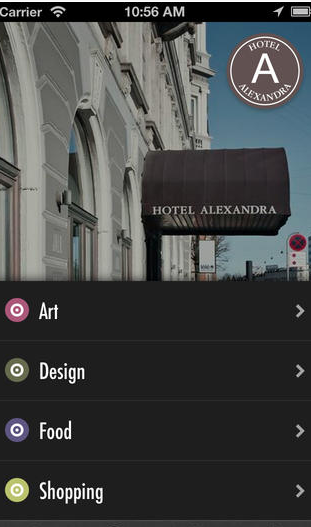
Their app is free, you can check it out here
Read more about the report from eMarketer
—-
By Tine Thygesen, CEO of Everplaces
[email protected]
If you’re considering making a in-destination app we’d love to help. Here’s some of the 60 apps we’ve already made with our partners and clients.
New study: Branded apps increase purchasing intent
A report about branded app usage helps digital marketing managers understand how consumers use branded apps. The report is full of good news for marketeers.
Most people use branded apps
More than half of smart phone users say they regularly use a store, brand or product app, says a February 2013 study conducted by Ipsos OTX and Ipsos Global Advisor, this demonstrates that it can be worthwhile producing apps for engagement.
Most popular for More info, then Deals
The good news for marketeers is that most people use the apps because they want to engage with the brand. In earlier years, many brands made games and gimmicky apps to create contact, but now utility apps are becoming more popular.
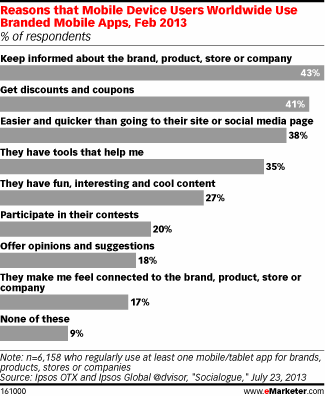
Apps are best for engagement
The general trend we’re seeing at Everplaces is that organizations are starting to use apps more to engage, than to build awareness. For example, in tourism we see a lot of focus on “in destination” information, the purpose of which is to improve the stay of the tourist, who then in turn is more likely to spread their good experience and talk about the destination on social media. Or brands that use apps to extend the experience for visitors to their website, offering an app that showcases products and shows the nearest store. This is in order to capitalize on the traffic and extend the conversation.
Apps increase purchasing intent
Perhaps the best news from the report is that consumers seeking more information via an app typically become more interested in purchasing in the process, as such 52% are more interested in buying after using the branded app.
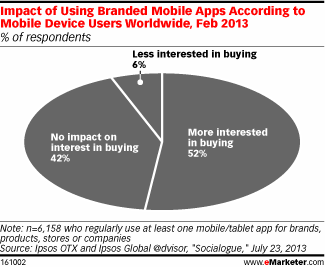
Cross promotion
What’s also clear from the report is that mobile apps often act as the gateway to the organization, so the consumer can find their way to web pages, social media pages, competitions or tools. As such, the consumer uses the branded app almost as a bookmark so they get to the information they need in the fastest possible way.
—
By Tine Thygesen, CEO of Everplaces
[email protected]
If you’re considering making a branded app we’d love to help.
